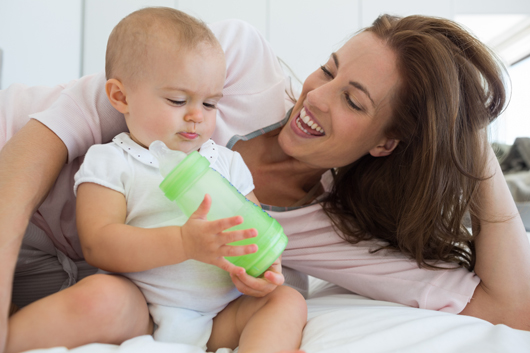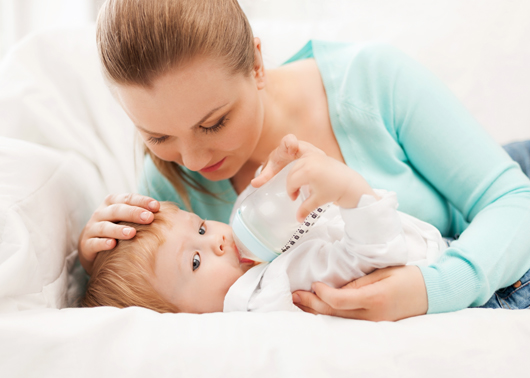LEARN MORE ABOUT FORMULA FEEDING AND ATTACHMENT PARENTING
Prior to having my first baby five years ago I didn’t frequent parenting blogs in the way that I have since.
I was therefore naïve to the prevalence of judgment and labelling that takes place in the world of motherhood.
So, when I needed to switch to formula feeding and attachment parenting after just four weeks of breastfeeding, although I was disappointed, I didn’t view it as a change to my overall parenting style.

Although to be honest, I didn’t really have a label to describe my style of parenting at the time – I simply tried my best to do what felt right to me.
But knowing what I know now, some might’ve tagged me a ‘responsive parent’. Some may have used the term ‘attachment parenting’, though others would say I’m far from it.
Which is why I’m not a fan of parenting labels to begin with – they’re far too restrictive and force people to adhere to a set of behaviours they feel is required in order to fit the label they’ve chosen.
And often the required behaviours are up for debate depending on which ‘expert’ you talk to.
There Are Challenges with Formula Feeding
Unfortunately, though, as a result of this type of stereotyping and labelling, new mums can be left feeling as though they’ve failed overall because they’ve been unable or unwilling to breastfeed – particularly if this is considered “against the rules” of their chosen philosophy.
My babies were bottle fed from around a month old. They were demand fed, both on the breast and then on the bottle. They slept in my room until they were 12 months (my 8-month old is still with me). I allowed a dummy. I pick up crying babies (and cuddle crying children). I don’t sleep train.
These were all simply choices I made though, not right or wrong, and not part of a grand plan to parent in a particular style.
Most likely I’ve made many other decisions that a staunch attachment parenting advocate would strongly disagree with.
And that’s fine too.
 But if you do like the ideals of – whether it’s co-sleeping, baby-wearing, gentle discipline, baby-lead weaning etc – nothing has to change simply because you’re bottle feeding your bub.
But if you do like the ideals of – whether it’s co-sleeping, baby-wearing, gentle discipline, baby-lead weaning etc – nothing has to change simply because you’re bottle feeding your bub.
But if you do like the ideals of – whether it’s co-sleeping, baby-wearing, gentle discipline, baby-lead weaning etc – nothing has to change simply because you’re bottle feeding your bub.
Making the most of formula feeding your little one
Bonding during feeds need not suffer either. You can mimic the emotional benefits of breastfeeding by:
• feeding in response to your baby’s cues
• paying attention to and responding to your baby during feeds
• holding your baby when feeding, even as she gets older
• pausing frequently, interacting, cuddling, and making eye-contacting
• feeding skin to skin when you can
• not trying to finish the bottle once the baby signals that he or she has had enough.
At the end of the day, parenting and this idea of ‘attachment parenting’ isn’t about following a set of rules, the reality is life simply doesn’t work that way even if we want it to.

